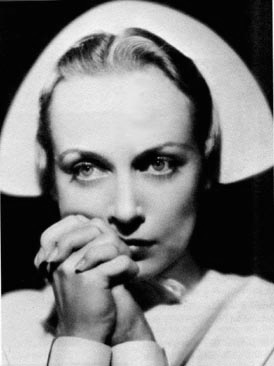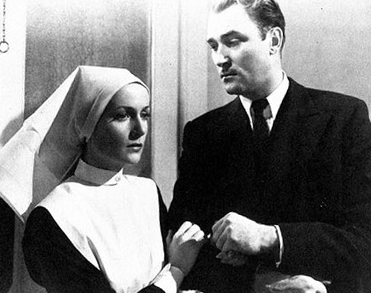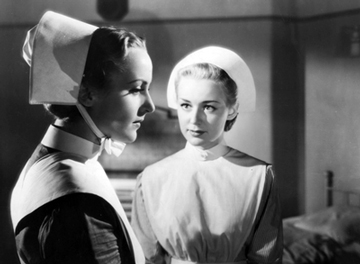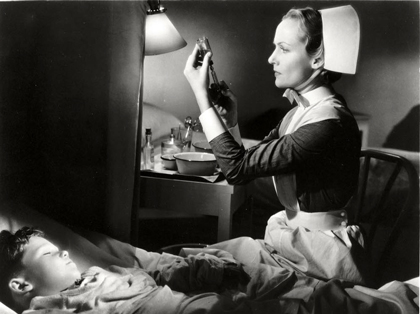
 |
|
|
|
From Alice Adams (1935) forward, just about every George Stevens film is a special item, if not a memorable classic. That leaves titles like Something to Live For as veritable orphans amid monuments such as Woman of the Year and Gunga Din. It's pretty clear that Mr. Stevens' personal outlook on his role as a filmmaker changed radically after WW2, when his movies for the most part became serious statements about life's most sobering subjects. 
Back in 1940 Stevens produced and directed Vigil in the Night, an inspirational movie about nurses and medical ethics, from J.J. Cronin's novel. Cronin also authored 'important books' with serious moral themes dealing with doctors (The Citadel) and a priest (The Keys of the Kingdom). Vigil follows the trials and travails of a virtuous nurse through the moral, ethical and practical minefield of her profession. It takes place in England, and the dialogue makes mention of the war. The star is Carole Lombard, taking a break from screwball comedies to tackle an 'important' dramatic role. Little did Lombard know, she was just four films away from a tragic death. Vigil in the Night takes a serious turn from the beginning. Siblings Anne and Lucy Lee (Carole Lombard & Anne Shirley) are nurses in an isolation ward for children's diseases; Anne has her credential and Lucy does not. Lucy abandons her post to make tea, and a helpless child suffocates. But when the furious medical staff investigates, Anne takes the blame upon herself. She turns down a marriage proposal from a beau, the unmotivated Joe Shand (Peter Cushing) and moves to a new position in London. There she puts up with the tyranny of the nurse's supervisor Matron East (Ethel Griffies of The Birds) and is almost fired when she dares to interrupt a surgical operation from the gallery. Vindicated, she attracts the attention of the head surgeon Dr. Prescott (Brian Aherne). Anne slowly earns the respect of all around her by her high standards of fairness and perseverance in the face of bureaucratic resentment, and even an old colleague who remembers the scandal at her previous post. Anne discovers that Lucy has married Joe on the rebound, but when he collapses into indolence Lucy returns to work. Dr. Prescott is livid that the rich Matthew Bowley (Julien Mitchell) won't fund a proper infectious isolation ward for the hospital, and the selfish Bowley ruins everything for Anne by propositioning her on her first day as a full surgical nurse. She's forced to resign in disgrace; Prescott does the same in protest over Bowley's lack of philanthropy. Then a major epidemic hits that kills children left and right. The overworked and underpaid nurses balk at taking the risky duty until Anne reappears to volunteer. She galvanizes the staff and the nurses into action. Anne orders a new ward to be constructed without consulting anybody, which brings the furious Bowley down to demand that she be fired once again. But this time things work out differently. Vigil in the Night is beautifully directed, nicely acted and extremely well intentioned, but it has serious problems of credibility due to story and thematic aspects that seemed out of date even in 1940. Rightly or wrongly, the whole conception of the "good nurse" ideal that Anne is supposed to embody, is just too extreme. The movie buys the idea that nurses must subordinate themselves like monks to a rigid lifestyle, working long hours for meager pay, with little or no time off and no room for any kind of private life. The harsh system treats them like slaves and assumes that anything that goes wrong is their fault. Any reasonable person would immediately see this as ridiculous exploitation; the women are forced into this Guild of Unending Service so that their labor won't be fairly compensated. Hospitals may lose money or make men like Bowley rich, but it's presumed that nurses like Anne are supposed to bear the economic burden as well as do all the work. 
Anne Lee's middle name must be Job, for she's clobbered with one miserable crisis after another, and is compelled to take the blame for the sins of others. Matthew Bowley comes on to her; when his wife finds out it is assumed that she's a seductress and is forced to resign. Until she's proved correct, her insistence that a sponge has been left inside a surgical patient is equated with a criminal act. None of this explains the opening scene's martyrdom, however, when Anne takes the blame for her grossly negligent sister. It may seem a noble thing to do, to protect Lucy so she can get her credential. But it's also dishonest, as Lucy is indeed not a particularly good nurse. That Anne takes Lucy's "sin" upon herself may seem like a Christian act, but it's against just about every code there is. She does it as a matter of personal ego, an expression of individualist defiance. Elsewhere the screenplay is fuzzy on details, and makes use of outrageous coincidences. Anne pretty much brushes off the poor sad sack Joe Shand but is surprised when he marries Lucy; it only makes Lucy seem even more incapable of acting responsibly. Nice guy Joe is branded as a serious loser and unworthy of Anne's time, let alone her confidence. Also, every time Anne's virtue threatens serious personal disaster, amazing things happen. A bus wreck interrupts a busybody just before the woman can spill the beans about Anne's 'crime' at her previous post. 1 A full-scale epidemic breaks out, giving the disgraced Anne a chance to show everybody that she's a superior leader. Most mawkish of all, the nasty moneybags Bowley refuses to part with a dime until his own son is stricken by the smallpox outbreak, whereupon he turns into a whimpering jellyfish. Anne sticks to her principles and prevails. 
Finally, the movie comes full circle with the eventual fate of Lucy Lee: we just know that no 1940 movie is going to let somebody get away with killing a child, no way no how. The screenplay buys into the notion voiced by the harsh nurse supervisor in the first hospital, that there are good nurses and bad nurses and nothing in between. A superlative nurse like Anne is bound to chafe against the intolerance and unfairness in the bureaucracy, but will prevail, because... because she's got The Right Stuff. A thoughtless ditz like sister Lucy will never make the grade, and the best she can hope for (to quote Al Roberts of Detour) is to make "An A-1 sacrifice in the last reel". Vigil in the Night creates interesting characters in a serious situation, but it takes place in a moral never-never land and its supposed ethics are a fraud. 2 Carole Lombard is extremely good as the virtuous Anne, and Brian Aherne is likeable as the conventionally noble doctor. Anne Shirley seems inconsistent as Lucy, as if nobody realized that 1940 movies were more or less incapable of presenting ambiguous characters. Peter Cushing seems overwrought as Joe Shand; his part should either be bigger to explain his anxiety, or cut down to nothing. Vigil in the Night was one of Cushing's biggest roles in his attempt to break into Hollywood, but he wouldn't achive real screen stardom until his UK TV work in the 1950s. Julien Mitchell and Doris Lloyd, as the nasty hospital overseers, present rather hiss-able villains. When they come to Anne and Prescott whimpering and pleading for their son's life, they remind us of the laughably silly fool parents in Willy Wonka and the Chocolate Factory. Even George Stevens' sober filming style breaks down, as the scene comes off like a perverse switch on an old Laurel & Hardy comedy. 
Excellent actress Ethel Griffies looks almost identical to her talky ornithologist in Hitchcock's horror show, 23 years later. Tiny child star Donnie Dunagan, lately 'rediscovered' by horror fan magazines, is one of the cute little boys in the dramatic sick ward scenes. There are no homely children in inspirational medical epics. 
The Warner Archive Collection DVD-R of Vigil in the Night is a good-looking transfer of this RKO production, which was possibly Stevens' effort to be more economical after the wildly over-budget Gunga Din. Some shots with miniature buildings, including a complicated crane shot for the opening, are quite good. The sound is less distinct, as if original tracks have not survived. Only few low-volume dialogue lines are unclear. Alfred Newman's music score makes heavy use of a musical processional heavily associated with English movies, or perhaps the English military. I've heard it used in some well-known title I must have seen twenty times, but can't pin down. Any help from Savant's many film music-savvy readers?
On a scale of Excellent, Good, Fair, and Poor,
Vigil in the Night rates:
Footnotes:
1. We can predict that this bus ride will going to end in a spectacular wreck, for the RKO special effects department use obvious miniatures for all views of the bus, and the movie needs something BIG to happen.
2. Our reaction to that entire opening situation is bound to be critical. The doctor and head nurse immediately jump to the conclusion that the kid died from negligence, and spare no mercy on the Lee sisters. That creaky "throat-bubble" setup doesn't look like something with a 100% success rate. Although Lucy Lee (unaccountably) acts like a total idiot, lollygagging in the kitchen when she's supposed to be staring like a hound dog at the sleeping kid, I can think of any number of accidental ways she could have been distracted long enough for the boy to suddenly expire. Are nurses expected to never, ever screw up on the job, under penalty of disgrace and exile? Despite the (even now) highly variable quality of health care in many developed countries, the movie takes the attitude that all sick people would recover, if it weren't for bad nurses and pinchpenny hospital executives.
Reviews on the Savant main site have additional credits information and are often updated and annotated with reader input and graphics. Also, don't forget the 2010 Savant Wish List. T'was Ever Thus.
Review Staff | About DVD Talk | Newsletter Subscribe | Join DVD Talk Forum |
| ||||||||||||||||||